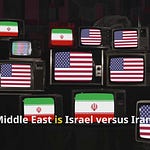Here, we examine what we assess to be errors presently made that threaten our coalition, and the broader war on Woke, undertaken, seemingly, as a way-too early jockeying of positions for ideological dominance in a post-Woke West.
Beyond just alienating allies, these errors lay the ideological groundwork for all that they fear may come. By confusing terms, context-swapping, and connecting errant metaphysics these allies accidentally empower future tyrants in the name of “liberty.” They have fallen conceptual-victim to well-placed political warfare narratives, and there is threat of open information warfare between the Christian and Secular sides of this coalition.
We are here to correct the record, demonstrate the errors, and to call for détente.
“We, that broad coalition or, at least, reluctant alliance of persons against Woke, have reached a point that was entirely predictable, and our early victories have led us to a fracture point. Such is the nature of being herded cats, coming together in a negative alliance against the bad thing pressing down on all of us. Now that the pressure has lessened – the boot to our necks no longer obstructing our carotids – we find ourselves struggling to agree on what the path forward ought to look like. This is of little wonder, as we all tend to believe, deeply, very different things.
First, however, let us offer a warning that, despite the return of blood flow and the lights no longer growing dim, the boot is not yet off our necks. It’s still there. It’s still connected to a body. The head attached to that body has been only temporarily dissuaded from crushing our larynx. Do not lose sight of the fact that a negative alliance in resisting Leftist tyranny is still both good and necessary. However, we must now discuss the matter of friendly fire, and the attempts of the chronically-centrist to establish “no-go” zones around anything that doesn’t look precisely like 1990’s American “golden age” – an age that inexorably led directly to the circumstances we have now stood together to combat for several years.
We note two ways of reasonable fidelity to describe this fracture point. The first is obvious, and it comes down to faith. This fracture point might be reasonably described as “secular” vs “Christian.” As a reminder, we are discussing the Right, not the Left, here, so we are ignoring the Left entirely for this analysis. This fracture point, understood in this manner, yields the predictable and familiar lines of engagement along such concepts as “separation of Church and State,” but it also goes much deeper into the very mechanisms of legitimation of government. However, we will recommend that this paradigm of “secular vs. Christian” is not, in fact, the best model for evaluating these matters.
Rather, the far better model is along the lines of “Athens vs. Jerusalem.” We intend to delve into this quite deeply in the coming episodes, but a brief explanation of this division suggests that not merely the battle, but the war itself, penetrates to the deepest levels of human understanding, belief, faith, ontology, epistemology, and that at these levels of conceptualization all persons can be placed in either the camp of the Greeks, or in the camp of Christ. Of course, nobody achieves total internal consistency and coherency in their worldview – that’s simply a reality of the limited nature of man. It’s also a function of history in the deep syncretism between the systems that has occurred repeatedly, but perhaps never as deeply as what occurred in Rome. Because of this people tend to have beliefs that vary between these two systems depending on topic or context. Let’s explore how this emerges and plays out, by internal logic, along various lines of contact in recent battles.
First, let’s discuss a basic truth about the nature of the major organized religions, to include that of the Christian faith. That matter is “eschatology.” This unusual word simply means religious beliefs in the end, whether that be “end times,” or the end of the “current age,” the second coming of Christ, the twelfth Imam, the Age of Aquarius, and so on. This concept of eschatology necessarily introduces a telos, or a directionality in history towards this point or event. Now, it’s conceivable theoretically that such an eschaton might come about suddenly, without warning, with no human input, with no signs, and so on. However, the reality of the eschatology of all religions we have even passing familiarity with suggests that no such eschatology as described actually exists. The closest thing to this is probably Dispensationalism, but even this doesn’t achieve this pure hypothetical unpredictability and immutability.
Rather, the eschatology of all major religions systems points to some degree of a gradual process towards the eschaton. More than gradual, many beliefs suggest a process of human action and interaction that is influential in the achievement of the eschaton. The Mullahs of Iran believe in an apocalyptic battle to precede the arrival of the twelfth Imam, and there’s some good reason to think that they might be aiming to engineer such a battle for that purpose. Dispensational Premillennial Christians likewise believe in a final battle that will precede Christ’s second coming – a fact that certainly has led to some American military adventurism in the Middle East, an outsized support of the state of Israel, and that might be perfectly happy to give Iran their apocalyptic war. Postmillennial Christians discard the premillennial interpretation of a final battle, viewing the book of Revelation as a historical telling of first-century events as opposed to a future prophesy, and adopt a view of Christ’s Earthly victory that might utilize that believer, through obedience, to advance His Kingdom towards that eschaton.
Of all the words that might be used to describe eschatology there is one that stands out as being both technically highly correct while simultaneously astoundingly misleading in practice. That word is “Progressive.” Yes, it is perfectly reasonable to say that the implications of all eschatological beliefs are “progressive,” as in they believe in a progression of human-mediated events in history leading to a specific end point, on a technical and descriptive basis.
However, the term “Progressive” has been made famous and comprehensible in the modern, western world by the ideology of Progressivism. Yes, that ideology of “Progressivism” is, in fact, eschatological, and, yes, the word itself does reference this believe in the human-mediated progression of history towards the eschaton. So, why then is it so misleading to use, and thereby conflate, these various beliefs all as “progressive?” Simply because the popular understanding of the term “Progressive” is inseparable from the particular beliefs and eschatology of the Leftist faith, and that it, necessarily, carries with it the implication of dialectics. Here, again, we see the proper understanding of the divide as being Athens vs. Jerusalem.
Now, let’s look to another line of conflict that has become something of a circular firing squad of late: “Christ is King.” First, let’s break this phrase down by how it’s been used and how those uses have been largely viewed by the following camps, and please try to remember who these four camps are as we discuss. We’re going to backtrack just a touch by breaking this divide along secular vs. Christian lines, as the higher-fidelity Athens vs. Jerusalem has not yet been fully established and fleshed out, and so this would take many thousands of words more to get through in that model, and Secular vs. Christian is reasonable in this instance. Group (a) very-online secular folks, (b) very-online Christian folks, (c) unplugged secular folks, and (d) unplugged Christian folks (and please do not confuse our use of “folks” to be implying Volkish nationalism).
First, the pre-operational use of the phrase “Christ is King” was common among the faithful of all denominations, and stands as something of a shortening of the Scriptural assignment of the title “King of Kings, Lord of Lords,” suggesting ultimate Kingship over all. Group (a) above largely ignored this usage, and didn’t seem to read much into it; however, they also don’t seem to have thought much into it, and the implications of it, which we’ll get more into shortly. Group (b) above would have been familiar and comfortable with the phrase, and it would have been fairly noncontroversial among them until deeper inquiry as to the eschatological implications of the various denominations set them against one another. Group (c) above was largely horrified by and militantly against this phrase even before the recent political warfare operations. Group (d) would have been, depending on denomination, varying degrees of comfortable and agreeing with it.
Amidst the early-stage operation people began to shift in their engagement with the phrase, “Christ is King,” as it rolled out and became established as a cudgel by aggressive non-Christians against Jews. Group (a) rapidly developed an offense reaction to the phrase, with varying degrees of discernment as to its use. Group (b) was significantly divided among those who were foremost concerned with the non-Christians wielding the Lords name in vain with this phrase, and those more concerned about the counter-reaction by the secularists who developed the offensive attack on the phrase. Group (c) largely became more militant in their opposition, and many used the opportunity to tar Christian uses of the phrase as identical to the blasphemous use as a cudgel by the non-Christians. Group (d), being largely out of the loop, and not seeing the manner in which this operation unfolded as the phrase was coopted by evil, largely went on the attack against group (a) and (c), because they saw the offensive battle against the phrase without the full context.
However, now that the dust has settled, we need to examine in a bit more detail where people continue to make errors here, and how that relates to broader errors being made that are dividing the coalition. Let’s take this backwards from “d” to “a.”
First, group (d) has mostly withdrawn from this public-facing battle, and they remain, as always, divided eschatologically as to the implications of the phrase. There is substantial movement among certain denominations and sorts to press the phrase even harder, now that the counter-attack by groups (a) and (c) have created something of a cultural taboo around the phrase. They are not happy about this, and they are not going to take this taboo-making lying down.
Second, the group (c) appears gleeful in their victory of taboo-making around this item culturally, and they have little desire to make any distinction between the sordid use of the term by non-Christians and the genuine, faithful use by Christians. They’re quite pleased with themselves that they’ve established a cultural victory of sorts after years of suffering very historically rare losses.
Third, group (b) remains somewhat divided as to who they are most upset with, but they are largely upset by both, as the dialectic did, in fact, do its work by establishing two polar sides by which the phrase was culturally “aufheben[ed],” and it took the work of both the original blasphemers and groups (a) and (c) to achieve this. That’s a major point of contention for group (b), as they, largely, genuinely believe that “Christ is King (of Kings, Lord of Lords).” It’s not a bumper sticker. It has implications for how to live, how to know, and why (ontology, epistemology, and ethics). They are undertaking counter-information operations around securing their understanding of this term now.
Group (a), the initiator of the counter-offensive operation against the blasphemers, now find themselves very much at risk of losing the necessary distinctions and carrying the counter-offensive too far. While early battle lines were fairly clear to both this group (a) and (c), the situation has devolved into less radically-wrong uses of the phrase, “Christ is King,” and a dangerous bit of mission creep by group (a). In initial operations this was, to anyone reasonably online and having a brain and good faith, an antisemitic operation resulting in a dangerous increase in Jew-hate among the “Right.” However, as group (b) conducts their own messaging in an attempt to normalize their own views, including the eschatological (“progressive”) views of genuine Christian faith, they are finding that group (a) has now turned their guns on them.
This seems to be a matter of group (a) seeking to box-out any competition to their own fundamental beliefs against allies in the battle against Woke. This “group (a)” is most commonly known, though we would argue it a low-fidelity term, as the “liberals.” Perhaps the most fundamental characteristic uniting the thought-leadership of this group is a belief in the possibility of “neutrality.” This is a belief that we do not hold, and would, and will, happy dissect. However, this belief in neutrality appears to be causing this group (a) to have something akin to an allergic reaction to the messaging of the Christian group (b), sensitized by the initial political warfare operation, and as they fundamentally do not view Christianity as neutral. So, these ideas of group (b), even though entirely unrelated to the original antisemitic operation, must be vigorously opposed according to this neutral ideology of group (a).
There are a litany of errors afoot, but one that we need to zoom in on a bit is the habit of persons to presume that other people think like they do, and believe what they do, and that what they believe, regardless of why, must be good. Very many people appear to have become far too comfortable with their own self-assurances that these Christians they have aligned themselves with can’t really believe in Christ’s Lordship over all things. “They can’t really believe that His word is perfect, totally sufficient, infallible, and applicable at all times, in all places, and to all persons.” Yet, that is exactly what the Christian is called to believe, and, more than that, that is what every Christian is called to act like they believe.
We need to remain allied against the Woke threat that has hardly begun to subside as of yet. However, there’s been a bit too much friendly fire of late. There’s been a bit too many attempts at condition-setting for victory a bit too early in this war, and it risks shattering this alliance. We will ask that a ceasefire occur, and that we refocus some public messaging towards maintaining our negative-alliance against Wokeism. This hopeful future condition ought to avoid explicit attacks on the faith-level beliefs of those within the coalition. In the meantime, we will also be undertaking education and information against the errors made by all groups, and towards our own condition-setting. Subscribe, and join us for our next episode, as we take a scalpel, then a sledgehammer, then a scalpel again to the deep error of “natural law.” Later we will examine, in depth, the how and why of Theonomy, as coupled with Spheres Theology, as the only firm basis for both liberty and good governance.
Counterspell Group.”
See below for a primer on “Spheres Theology.”
Ordo Amoris, Ordo Regiminis
This week we take a momentary departure from our Americanism series to capitalize on the controversy over “ordo amoris,” or the Christian concept of rightly ordered, hierarchical loves. Along with th…













Share this post